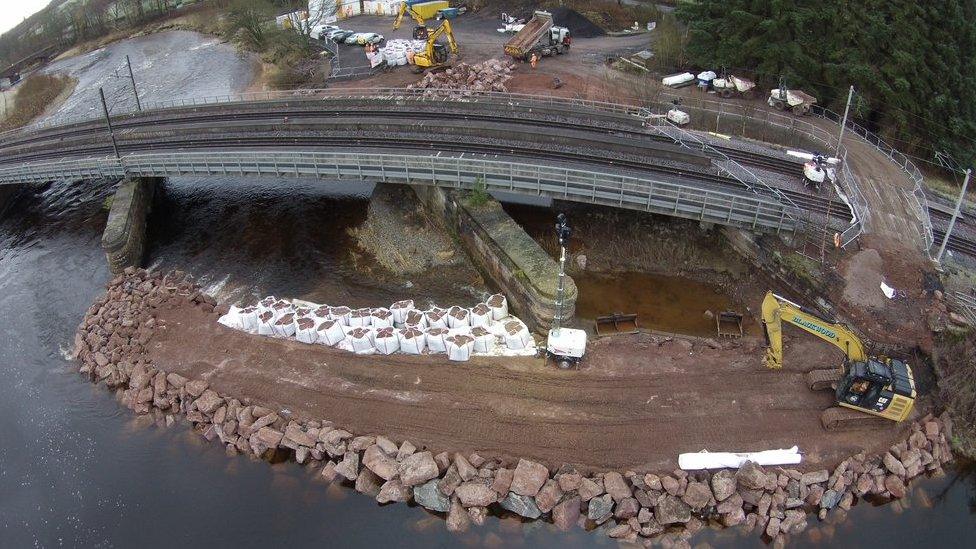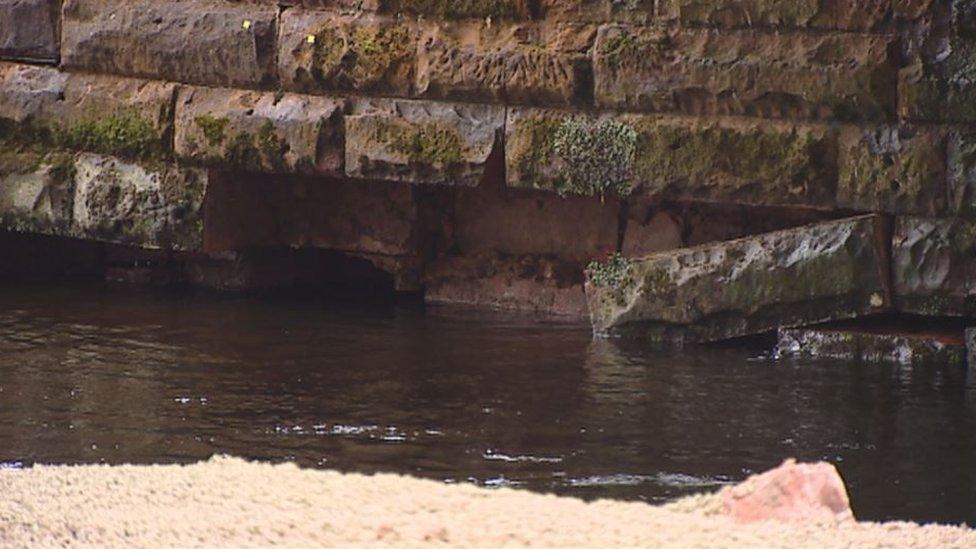Further delay possible on West Coast Main Line repair
- Published

Work has been carried out at Lamington to shore up the vital rail crossing
Engineers working to repair the West Coast Main Line have said damage to a crucial viaduct is more severe than they first thought.
The line had to be closed after water pressure undermined a pier of the Lamington Viaduct in South Lanarkshire.
An initial assessment led engineers to predict that the line could be back to normal operation by 1 February.
They have now said that a new timetable for repairs will not be issued until next week.
Phil Verster, of Scotrail Alliance, said: "By next week we will announce to the public what our full recovery date will be for the West Coast Main Line.
"A significant amount of work is being done now to stabilise the pier.
"We are not exactly sure what our repair programme will be for the remaining period during January but we will announce that by the back end of next week."
Since the damage was caused during Storm Frank, main line trains have been operating from London to Carlisle. Passengers have to change there, using a replacement bus service or a shuttle rail service via Dumfries to reach Glasgow.
Further extended work
Mr Verster added: "I set the deadline of the 1st of February at a time when we understood the damage to be less than what we have seen now.
"So we are going to do everything by next week to finalise what the programme should be and can be for the further extended work that we now have to do to recover the pier."
Heavy rain in the last few days of 2015 left the River Clyde swollen at the point where the railway line crosses it at Lamington.
The waters have now receded, leaving the structure unsafe for trains to pass over the viaduct.
"This is a massive challenge for us," admitted Mr Verster.
"The damage we have found in the last couple of days has been much more severe than we thought. Turbulence and vortices actually undermined the structure of the pier significantly.
"We are now in a programme to stabilise that pier by Sunday and next week we will finalise our programme for the repair."

The water of the Clyde has undermined parts of the pier supporting the viaduct
Ministers
The site of the work at Lamington has been visited by Scottish transport minister Derek Mackay and UK railways minister Claire Perry.
Mr Mackay said: "We appreciate the patience of the travelling public whose journeys have been disrupted as a consequence of both significant weather events and other structural problems such as we've seen here.
"There's been record spending and there'll be a continuation of that record spending on both infrastructure and rolling stock - and indeed new technology. But of course we can look at further devices and learn lessons from incidents such as this."
The UK government has been emphasising how much is being allocated to railway investment.
Ms Perry said: "We are investing record amounts of £38bn over the next five years and part of that is of course to make sure - whether it's sea walls at Dawlish or bridge structures across flood-prone parts of the country - they are safe."
She admitted she could not say exactly how much is being spent on climate resilience.
She said: "I actually don't know the answer but what I can tell you is, for the first time in 100 years we are spending these amounts of money on the railway structure and of course the railway structure is a lot smaller then is was 100 years ago."
Kilmarnock line
Virgin Trains will operate a regular hourly shuttle rail service between Glasgow and Carlisle via Dumfries from this weekend.
Phil Bearpark of Virgin Trains said: "We've worked really hard with our industry partners in the ScotRail Alliance to put in place a diversionary service between Glasgow and Carlisle via the Dumfries route and are really pleased that, from Sunday, frequencies will increase to hourly throughout most of the day.
"Journeys for customers travelling to Carlisle and onwards stations, including London, will still take just over an hour longer than normal but will mean that most of our customers will no longer have to use buses."
This temporary service will cause disruption to ScotRail's Glasgow to Kilmarnock route.
Many of the regular trains to stations on the line are to be replaced by a bus, starting on Monday 11 January.
ScotRail has advised passengers travelling to or from Kilmarnock itself to use the Virgin service which, which will stop at Kilmarnock only.
The company said these arrangements would be in place "until further notice".